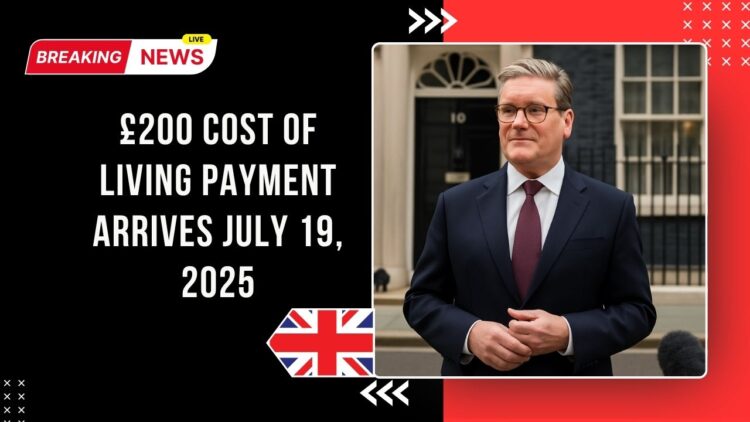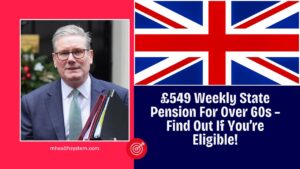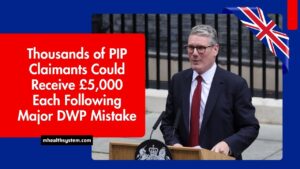As the cost of essentials like food, rent, and energy continues to rise across the UK, the Department for Work and Pensions (DWP) is providing extra financial support.
On July 19, 2025, eligible residents may receive a £200 Cost of Living Payment through the Household Support Fund, a government-funded relief initiative.
Let’s break down what this payment is, who qualifies, how to apply, and what you can use it for.
What Is the £200 Payment?
The £200 Cost of Living Payment is a one-off grant meant to support low-income households during times of financial strain. It’s distributed via local councils and funded by the DWP, separate from other benefit payments and does not need to be repaid.
This money can be used for energy bills, rent, food, or other essential needs, giving flexibility to those who need it most.
Eligibility Criteria
While final eligibility depends on local councils, here are common requirements:
- Low-income households
- Receiving Universal Credit, Pension Credit, ESA, JSA
- Disabled individuals on PIP, DLA, or Attendance Allowance
- Pensioners with limited savings
- Single parents or households with children
- Those recently impacted by job loss, reduced hours, or rising bills
- Working families under a certain income threshold may still qualify
How to Apply for the £200 Payment
There are two main ways to receive the payment:
Option 1: Automatic Payment
If you’re already receiving support through certain local schemes, your council might issue the payment automatically. You’ll either receive a bank transfer or a notification letter.
Option 2: Manual Application
If not automatic, follow this process:
- Visit your local council’s website
- Go to the Household Support Fund section
- Review the eligibility criteria
- Prepare supporting documents (e.g., ID, proof of income or benefits)
- Submit your application online or via phone
- Await confirmation and payment details
Payment Methods
Once approved, the £200 grant may be issued as:
| Payment Method | Details |
|---|---|
| Bank Transfer | Direct deposit into your account |
| Energy/Food Voucher | Redeemable at utility providers or grocery retailers |
| Credit to Supplier | Direct credit to your energy or water bill account |
What Can the £200 Be Used For?
You have complete control over how to use the money. Most recipients use it for:
- Groceries and toiletries
- Utility bills (gas, water, electricity)
- Prepayment meter top-ups
- Clothing or rent
- Urgent home needs
What If You’re Not Eligible?
If you don’t qualify, don’t worry—other support options may still be available:
- Energy support grants through your supplier
- Discretionary Housing Payments
- Council tax and water bill discounts
- Healthy Start vouchers (for children and pregnant women)
- Free school meals
- Local food banks and crisis grants
Check your council’s website or contact Citizens Advice for help.
Eligibility Tools
To make sure you qualify, use:
- Benefits calculators (available online)
- Live chat tools on council websites
- Community advice centres for in-person help
Summary Table
| Detail | Information |
|---|---|
| Payment Date | July 19, 2025 |
| Payment Amount | £200 one-off |
| Who Qualifies | Low-income households, pensioners, carers, benefit claimants |
| How to Apply | Through local council (some automatic, some via application) |
| Payment Methods | Bank deposit, voucher, or direct credit to energy account |
| Use of Funds | Food, rent, utilities, clothing, emergencies |
With inflation and cost of living pressures still affecting millions, the £200 Cost of Living Payment on July 19, 2025 is a welcome relief for UK households. Whether you’re on benefits or working with low income, this payment could ease your burden.
Check your local council’s website today, ensure you meet the eligibility criteria, and apply early to avoid missing out. Every pound counts when times are tough—and this £200 could make all the difference.
FAQs
When is the £200 Cost of Living Payment being issued?
The payment is scheduled for July 19, 2025, depending on your local council’s processing time.
Do I need to repay the £200?
No, this is a non-repayable grant issued to help with essential living expenses.
Can working families apply too?
Yes, provided your household income is low enough, you may still be eligible even if you’re employed.




